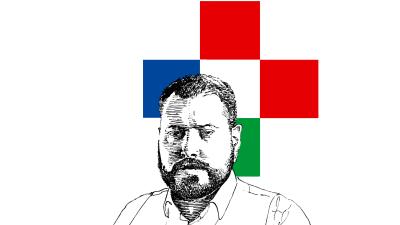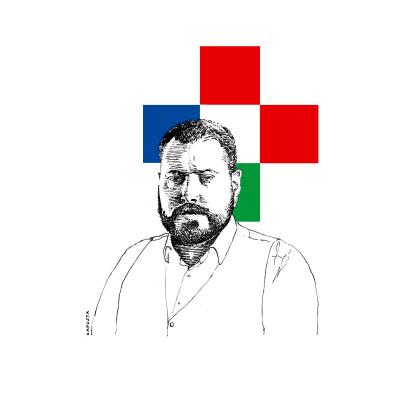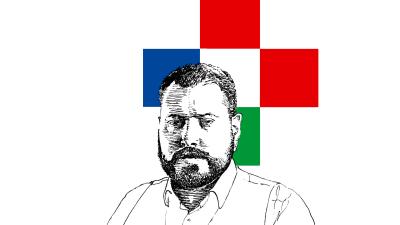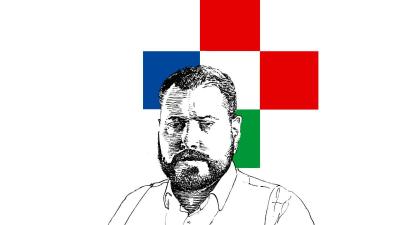Azerbaijan, the new essential partner
Unsurprisingly, the dominant subject of Hungarian news in January was the economic and energy crisis, accentuated by the war in Ukraine and the sanctions against Russia. Forced by the EU to diversify its energy supplies in the context of the lasting separation of Western Europe from Russia, Hungary strengthened its partnership with Azerbaijan.
On 30 January, the flags of the two countries were flying on the Erzsébet Bridge in the heart of Budapest: Azerbaijani President Ilham Aliyev came in person to meet Viktor Orbán at the Carmelite cloister, the headquarters of the Magyar strongman. On the agenda of the discussions was the recognition that Azerbaijan is no longer a "friend" but a "strategically important country for the whole of Europe". Seven agreements were also signed, strengthening cooperation in the fields of natural gas, agriculture, space exploration and migration.
Indeed, Orbán made it clear: "The need for energy diversification will strengthen Azerbaijan's value". That former Soviet republic, close to Turkey, has recently become a country that cannot be ignored by the European Union. The above is true despite its dispute with Armenia and the political regime which is not quite up to Brussels' expectations - for example, with regard to Hungary.
At the Bucharest summit in December 2022, Romania and Georgia joined Hungary and Azerbaijan in announcing with great fanfare the project for the world's longest underwater power line, linking Azerbaijan to Hungary at the bottom of the Black Sea.
Obviously, adept at the policy of balance and having succeeded in diversifying his diplomatic contacts well before his energy supplies, Viktor Orbán has re-established diplomatic relations with Armenia after ten years of rupture. The reason for that break in diplomatic relations was a sordid incident that took place in Hungary, in which an Azeri had murdered an Armenian. Hungary then extradited the "axe murderer" at Baku's request, provoking the ire of Armenia, which is in permanent conflict with Azerbaijan.
Ukraine, Czech Republic, Slovakia, neighbourhood problems
Despite the brilliance with which Orbán conducts his diplomacy, a grey area is evident in relations with certain countries, and not just any countries.
First of all, the two partners in the Visegrád Group, the Czech Republic and Slovakia, are ostensibly at odds with Hungary. The Slovak Foreign Minister's statements are unequivocal: “According to my criteria [...] Hungary is not a Western-style democracy. I see it like this, and I am very sorry, but it is the only country in the European Union that is not a full-fledged Western-style democracy. And this is not only my opinion, it is the majority opinion of the European Parliament and the European Commission, and my colleagues with whom I have spoken also think the same. It doesn't matter if we say it in a stronger or more diplomatic way.”
With these words, Rastislav Káčer thus joins the EU mainstream which accuses Hungary in particular of not respecting the "rule of law". This is a vague notion not defined in the current treaties, and increasingly synonymous with liberal and technocratic democracy rather than with respect for universal law.
In the Czech Republic, the election at the end of January of the former general of the NATO Military Committee, Petr Pavel, did not help matters for Viktor Orbán. Resolutely Atlanticist and progressive, Petr Pavel pointed the finger at Viktor Orbán – without even waiting to be sworn in.
For the Czech president-elect, the dismissal of nearly two hundred officers of the Hungarian army is a gesture of de-NATO-ification of the Hungarian army in favour of pro-Russian officers. A view that is not shared by military experts and is attributable only to the opposition Eurofederalist MP Ágnes Vadai, who is known for her buzz.
On the contrary, the rejuvenation of the officer corps, a consequence of the ministerial decree of 17 January, favours young officers who have experience abroad in NATO forces, who have knowledge of English and who meet the needs of modernising the Hungarian army according to NATO standards.
However, President Pavel, who had come to Hungary in December to meet with Hungarian left-wing opposition figures, of course also denounces the Hungarian position on Ukraine. He says that “if one thinks like Orbán, then victory would be to stop the war at this stage, give the Russians what they have taken so far and sign an agreement. But I think that on this point it is entirely up to the Ukrainians to define what victory should be.”
This is because Hungary, which has been at odds with Ukraine for years as a result of Kiev's centralising policies, does not look kindly on the treatment of ethnic Hungarians in Subcarpathia, nor on the massive arming of a neighbour whose representatives regularly threaten Hungary in the press. Not to mention President Zelensky's support for the left-wing opposition in the Hungarian elections of April 2022, which Viktor Orbán eventually won by a landslide.
In an off-the-record discussion with foreign journalists and teachers working in Hungary at the invitation of the MCC, an educational organisation close to the government, Viktor Orbán expressed two opinions that did not help the tense situation with his eastern neighbour. Not only did he say that Ukraine would lose the war and that the situation would get even worse as a result, but he also called Ukraine a "no man's land". According to the Hungarian Prime Minister, Putin's aim is to make Ukraine a ruin, not least so that the West cannot claim a tangible victory. And for Viktor Orbán, this goal has already been achieved, he explained, before comparing Ukraine to Afghanistan.
Price freeze and birth control measures
Despite a significant strengthening of the forint in recent weeks, the economic situation is not good and, as elsewhere, small businesses are closing due to the rising energy prices. In particular, food prices continue to increase.
Against this background, the Hungarian government decided to extend the price freeze on basic foodstuffs such as granulated sugar, wheat flour, sunflower oil, pork leg, chicken breast and chicken carcass, eggs, potatoes and UHT milk until 30 April.
At the beginning of January, another social measure came into force, adding to the long list of natalist measures: mothers under the age of thirty are now exempt from income tax. This measure is valid from the 12th week of pregnancy until the tax year in which the woman in question turns 30.
Read also
On the hypocrisy of progressives
If there's one fascinating thing about the progressives, it's that they never really stop on the road to progress. And even when the discovery of their new advances leads us to believe that their model is not sustainable, so devoid of common sense does their madness seem, paradoxically, this permanent progress tends to prove them right: Progress ostensibly knows no limits.
Ferenc Almássy
Monthly Country Report: Hungary
On 8 June, the interior ministers of the 27 EU Member States approved by a qualified majority in Brussels a migration agreement that the European Commission described as "a historic agreement reached this evening between Member States on two key texts of the Pact on Migration and Asylum".










Comments (0)